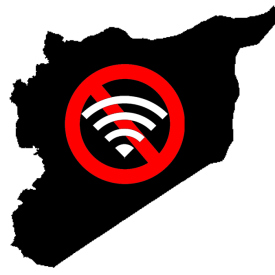 NEWS
NEWS
 NEWS
NEWS
 NEWS
NEWS
![]() For the second time in six months, Syria has just fallen off the face of the internet. Umbrella Labs reports that outbound and inbound traffic to the country just flatlined in the space of two minutes overnight on Tuesday, leaving the country facing a web blackout that has lasted for 14 hours and counting.
For the second time in six months, Syria has just fallen off the face of the internet. Umbrella Labs reports that outbound and inbound traffic to the country just flatlined in the space of two minutes overnight on Tuesday, leaving the country facing a web blackout that has lasted for 14 hours and counting.
As I write, both Top-Level Domain servers in the country appear to be out of action, while Google’s Transparency Report confirms that traffic to its services from the country had ground to a halt. Meanwhile, web montioring firm Akamai is also confirming what appears to be a total block on web traffic in and out of Syria.
There’s been no official statement on the event so far, but Syria’s government is widely believed to have manipulated internet access in the country on several occasions since civil war broke out in the middle of 2011. Back in July 2012, security firm Renesas reported a minor, 40-minute blackout across the country that saw all networks routed through the Syrian Telecommunications Establishment ISP go down. Then there was last November’s momentous event that caused the internet to flatline for three days, along with virtually all landline and mobile connections as well, reportedly at the same time as Syria’s government carried out a major operation to defend Damascus International Airport from a rebel attack. This was followed by a second massive drop in traffic in December that was once again linked to clashes between the rebels and the Syrian Army. On both occasions, Syria’s government said that the rebels were to blame, though short of blowing its web servers apart or cutting undersea cables, it’s unlikely they’d be able to achieve such an act.
This latest incident began around 19:45 GMT, with the ns1.tld.sy and ns2.tld.sy nameservers simultaneously going down, taking all websites with the .sy domain offline with them. Just minutes later, all inbound and outbound traffic came to a grinding halt, as you can see in this YouTube video of the event posted online by Frederic Jacobs.
Umbrella Security’s Dan Hubbard said that the blackout began when Syrian servers suddenly became inaccessible through the country’s Border Gateway Protocol (BGP) route. He wrote that only three out of the usual 80 routes in the BGP routing tables for Syria were working normally.
“Although we can’t yet comment on what caused this outage, past incidents were linked to both government-ordered shutdowns and damage to the infrastructure, which included fibre cuts and power outages,” writes Hubbard.
Meanwhile, Danny O’Brien of the Electronic Frontier Foundation focused on the damage that a lack of online communications would cause in the country:
“While heavily censored, monitored, and compromised, the Internet has served as an important window connecting the world at large to Syria, and one way that international observers could connect with individuals on the ground in that country. A number of activists on the ground in Syria have access to Internet via satellite links, which can connect them to the Internet but carries a high risk for detection, which can be life threatening.”
According to CloudFlare, the same technique of withdrawing the BGP routes was used to disrupt Syria’s internet access last November, something that suggests that the government is almost certainly responsible for it. Of course, Syrian President Bashar al-Assad has carried out hi-tech warfare in the past, using internet surveillance kits to spy on dissidents and install malware onto activists’ computers, while the Syrian Electronic Army is thought to be responsible numerous disruptions of opposition websites on his behalf.
THANK YOU